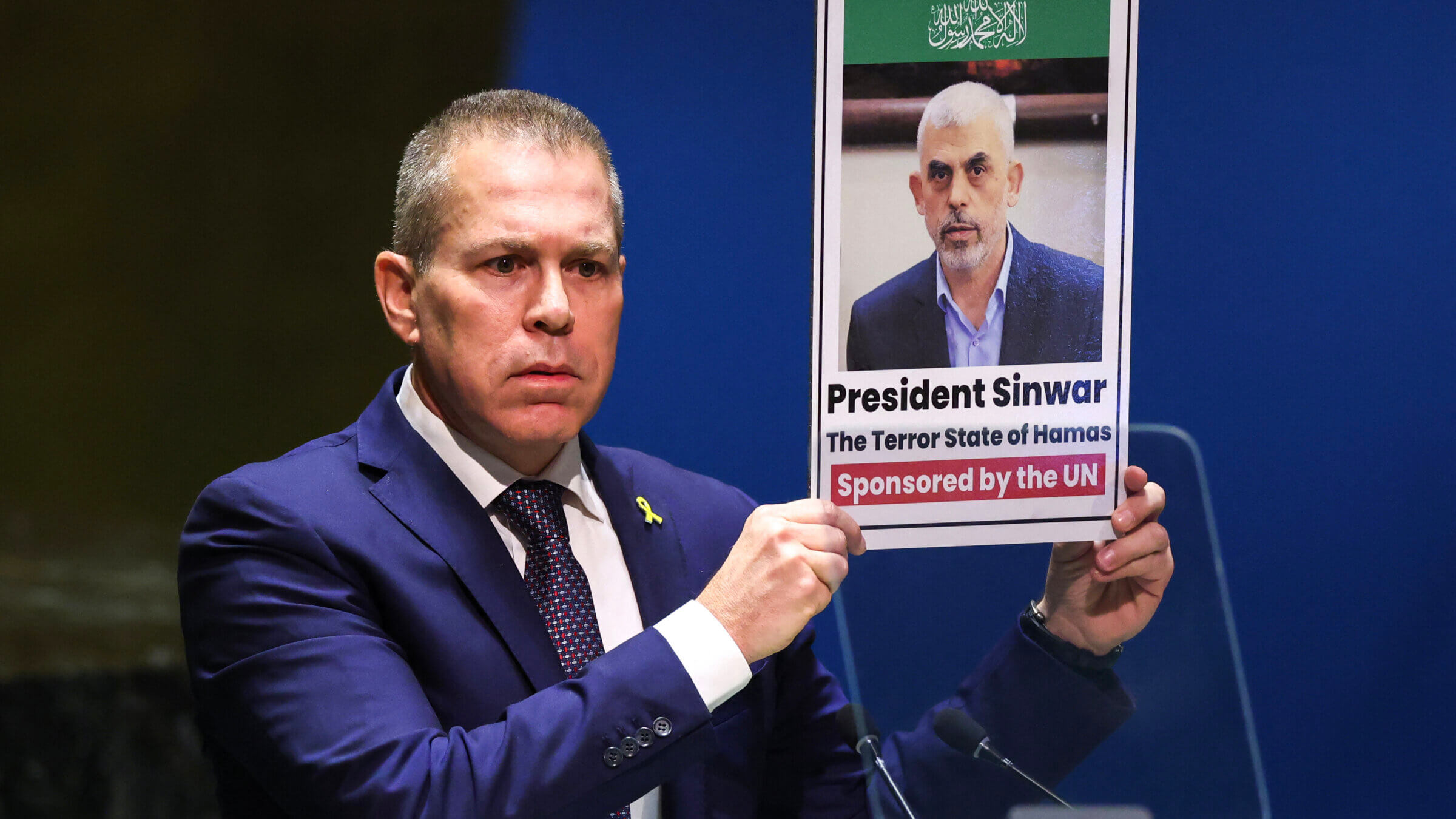Sinwar’s death is a chance for Israel to declare victory and pivot in Gaza
Netanyahu should give amnesty to those holding hostages, take the lead in rebuilding Gaza and form a national unity government

Israeli Ambassador to the U.N. Gilad Erdan holds up a picture of Hamas leader Yahya Sinwar during a special session of the U.N. General Assembly regarding the Palestinian bid for full membership to the U.N. Photo by Charly Triballeau/AFP via Getty Images
Israel’s confirmation on Thursday that its forces eliminated their No. 1 target, Hamas chief Yahya Sinwar, gives Prime Minister Benjamin Netanyahu a critical opportunity to declare victory in Gaza and pivot to a wiser strategic approach.
As the mastermind behind countless attacks on Israelis and the main orchestrator of the Oct. 7 Hamas massacre, Sinwar was an arch-terrorist who got what he deserved. But his death marks much more than the removal of a single evil leader; it’s a chance for Israel to redefine the trajectory of the conflict.
The Israeli military said it had confirmed via DNA testing that Sinwar was one of three militants killed in a firefight in Gaza on Wednesday (it had Sinwar’s DNA from his time in Israeli prison). The defense minister, Yoav Gallant, said Israel had “closed its accounts” with Sinwar, and that he “died while beaten, pursued and on the run.”
For far too long, Israel has been mired in what seems like a forever war: a cycle of retaliation and defense without a clear endgame, partly because Netanyahu’s governing coalition is dependent on far-right parties that want to reoccupy Gaza. That has prevented Israel from establishing reasonable long-term goals, and has caused the steady evaporation of global support for its actions.
Changing this terrible trajectory requires a major event, and Sinwar’s elimination could be just such a thing. Not every terrorist is replaceable; the charismatic and wily Sinwar, the leader since August of both the political and military wings of Hamas, may be a singularity.
He learned excellent Hebrew in two decades in Israeli prison and was released in 2011 as part of a deal freeing about 1,000 prisoners in exchange for the captured Israeli soldier Gilad Shalit. Known for charm and cruelty in equal measure, he was an icon in Gaza.
Sinwar, who was in his 60s, was widely seen as the source of Hamas’ obstinacy over the past year, and of the group’s determination to project indifference to the tremendous damage caused to Palestinians in Gaza, where more than 40,000 people have been killed, and many more displaced and deeply suffering, during the war.
His departure from the scene is a milestone Netanyahu should use to transition to a new strategic phase.
Israel must now finally focus on crafting a comprehensive “day after” plan for Gaza, with the help of a revamped Palestinian Authority and moderate Arab nations, and with the financial and diplomatic backing of the United States and European Union.
Israel and its allies must take the lead in rebuilding Gaza, which has been largely reduced to rubble. A reconstruction plan — focused on providing humanitarian aid, restoring infrastructure and fostering local leadership untainted by Hamas — should be at the forefront of Israel’s strategy.
There are, of course, risks as well. With the elimination not only of Sinwar, but also the Hamas leader-in-exile, Ismail Haniyeh, and military chief, Mohammed Deif, the group’s leadership structure is in disarray. That makes it unclear who can negotiate release of the 101 hostages still in Gaza, a necessary condition for Israel ending the fighting.
Gallant, the defense minister, issued a terse warning Thursday to the remaining Hamas commanders: “The time has come for you to emerge, release the hostages, raise your hands, and surrender,” he said.
But Hamas fighters or rogue families holding hostages might resort to executing them in retaliation for the loss of their leaders. It is essential that Israel immediately projects a message of amnesty, offering whoever is holding captives an incentive to release them unharmed. This message must be delivered clearly and reinforced at every level; the return of Sinwar’s body can be a bargaining chip. The alternative — an uncontrolled, chaotic response — could lead to unnecessary bloodshed.
A new strategic phase may also offer the chance for political change in Israel, enabling an alternative to a government that is widely despised locally and has little credibility internationally.
The best immediate option would be a national unity government, in which opposition leaders Yair Lapid, Benny Gantz, Yair Golan and Avigdor Liberman all agree to serve under Netanyahu in exchange for a set election date within one year.
Such a move would show the world that Israel is capable of both decisive military action and responsible governance. It would offer reassurance to allies that Israel’s leadership is stable, thoughtful and capable of navigating the complex aftermath of Sinwar’s killing.
There could also be implications at the International Criminal Court, which has been expected to issue arrest warrants relating to the Gaza war for Sinwar, Deif and Haniyeh as well as Netanyahu and Israel’s defense minister, Yoav Gallant. With the Hamas leaders gone, the ICC would risk further undermining its credibility if it moves against the Israelis alone.
If handled wisely, the killing of Sinwar could mark the end of an era of endless war and the beginning of a new phase in Israeli and Palestinian relations. Ironically, a man responsible for so much death could have as part of his legacy a breakthrough that actually spares the lives of countless Palestinians and Israelis.
















